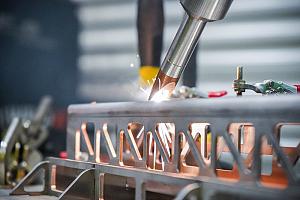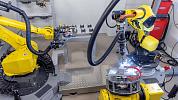- FMA
- The Fabricator
- FABTECH
- Canadian Metalworking
Categories
- Additive Manufacturing
- Aluminum Welding
- Arc Welding
- Assembly and Joining
- Automation and Robotics
- Bending and Forming
- Consumables
- Cutting and Weld Prep
- Electric Vehicles
- En Español
- Finishing
- Hydroforming
- Laser Cutting
- Laser Welding
- Machining
- Manufacturing Software
- Materials Handling
- Metals/Materials
- Oxyfuel Cutting
- Plasma Cutting
- Power Tools
- Punching and Other Holemaking
- Roll Forming
- Safety
- Sawing
- Shearing
- Shop Management
- Testing and Measuring
- Tube and Pipe Fabrication
- Tube and Pipe Production
- Waterjet Cutting
Industry Directory
Webcasts
Podcasts
FAB 40
Advertise
Subscribe
Account Login
Search
Manufacturing optimism buoyed by innovation and adaptability, study says
- August 20, 2021
- News Release
- Shop Management
While manufacturers continue to face supply chain disruptions as a result of the pandemic, these companies are more optimistic (65%) than the national average (52%), saying they expect overall economic conditions in the U.S. will improve, according to a recent study from Umpqua Bank, Portland, Ore.
Manufacturers also appear more likely than other sectors to do business differently than they did pre-pandemic. About 73% of companies surveyed expect to maintain most or all of the changes put in place since March 2020. That's far higher than the national average of 54% and any of the eight industry cohorts covered in the survey.
The findings are part of the “2021 Business Barometer” report released by Umpqua Bank that provides an in-depth study into the mood, mindset, and strategic priorities of nearly 1,200 leaders at small and midsize companies across the U.S. The survey breaks down results into seven major industries.
The survey clearly shows that manufacturers will continue to retool their approaches over the next year. About 61% of manufacturers said they were likely to change their products and services—more than any other sector, and well above a survey average of 37%. Half of the manufacturing businesses said they plan to change their pricing model, slightly higher than the 45% average for all survey respondents. And 70% of companies surveyed said they want to find ways to automate repetitive tasks previously performed by workers, more than any other sector and much higher than the national average of 44%.
"Manufacturers from small shops to midsized companies have showed remarkable resilience during the pandemic, investing in automation and evolving the way they've done business over the years," said Richard Cabrera, executive vice president and head of middle market banking at Umpqua Bank. "Even through all the difficulty, the pandemic has served as a catalyst in jump-starting new approaches, with a newfound focus on efficiency and productivity."
Some other key takeaways from the survey:
- Roughly 55% of manufacturers said they were more likely to take on debt to finance growth over the next 12 months, compared with an average of 29% for all companies, and by far the highest among all industries, trailed by business services (35%), construction (34%), and wholesale (27%).
- The optimism of manufacturers (65%) was higher than any other industry, such as wholesale (59%), finance/insurance/real estate (58%), and construction (56%).
- About 36% said that they're considering an increase to their real estate footprint, versus 32% for all sectors.
- About 30% said they are more likely to acquire another business in the coming year, versus 26% of all companies.
- Manufacturers' focus on automation (70%) far outpaced the other sectors, such as wholesale (56%), business services (50%), retail (40%), and health care (27%).
"Without a doubt it has been a difficult time for many manufacturing businesses over the last year or so, but we see very encouraging signs," Cabrera said. "We're likely entering a new phase of competitiveness, marked by entrepreneurship, creativity, and innovation."
subscribe now

The Fabricator is North America's leading magazine for the metal forming and fabricating industry. The magazine delivers the news, technical articles, and case histories that enable fabricators to do their jobs more efficiently. The Fabricator has served the industry since 1970.
start your free subscription- Stay connected from anywhere

Easily access valuable industry resources now with full access to the digital edition of The Fabricator.

Easily access valuable industry resources now with full access to the digital edition of The Welder.

Easily access valuable industry resources now with full access to the digital edition of The Tube and Pipe Journal.
- Podcasting
- Podcast:
- The Fabricator Podcast
- Published:
- 04/30/2024
- Running Time:
- 53:00
Seth Feldman of Iowa-based Wertzbaugher Services joins The Fabricator Podcast to offer his take as a Gen Zer...
- Industry Events
Pipe and Tube Conference
- May 21 - 22, 2024
- Omaha, NE
World-Class Roll Forming Workshop
- June 5 - 6, 2024
- Louisville, KY
Advanced Laser Application Workshop
- June 25 - 27, 2024
- Novi, MI
Precision Press Brake Certificate Course
- July 31 - August 1, 2024
- Elgin,






























